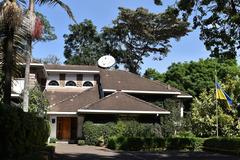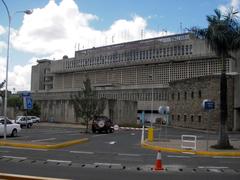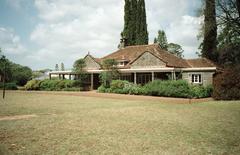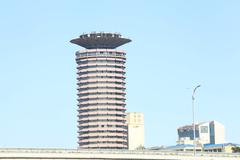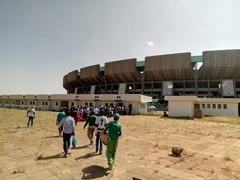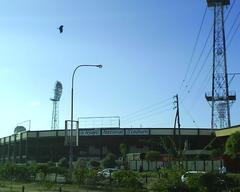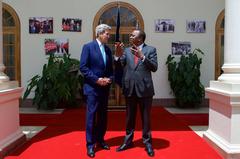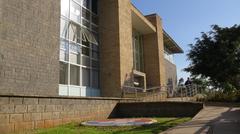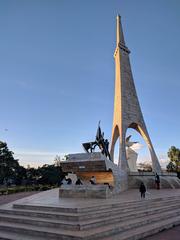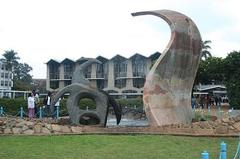Nairobi City Stadium Visiting Hours, Tickets, and Guide to Nairobi Historical Sites
Date: 04/07/2025
Introduction
Nairobi City Stadium is a landmark of Kenya’s sporting, cultural, and urban heritage. As one of the oldest and most historic stadiums in the country, it has played a pivotal role in the evolution of sports, politics, and community life in Nairobi. This comprehensive guide covers everything from the stadium’s fascinating history and architecture to practical visitor information, including Nairobi City Stadium visiting hours, ticketing details, accessibility, and nearby attractions. Whether you are a sports enthusiast, a history buff, or a traveler seeking to explore Nairobi’s historic sites, Nairobi City Stadium offers an authentic glimpse into the city’s vibrant pulse and enduring legacy (Michezo Afrika; Eastleigh Voice).
Table of Contents
- Introduction
- History and Evolution
- Decline and Modernization
- Social and Urban Impact
- Visitor Information
- Unique Visitor Experiences
- Nearby Attractions
- Practical Tips for Visitors
- Frequently Asked Questions (FAQ)
- Conclusion and Final Travel Tips
- References
History and Evolution
Early Origins and Naming
Nairobi City Stadium, established in the early to mid-20th century, stands as Kenya’s first major sports venue. Its earliest name, the African Stadium, was a reflection of its significance during the colonial period as a rare space for indigenous Kenyans to gather and compete, at a time when racial segregation limited access to sports facilities (Wikipedia). Over the decades, the stadium underwent several renamings—becoming Donholm Road Stadium and then Jogoo Road Stadium after independence—before finally being designated Nairobi City Stadium, in line with its central role in the city’s identity (Eastleigh Voice).
Role as Nairobi’s Principal Sporting Venue
Until the construction of larger, more modern venues such as Nyayo National Stadium (1983) and Moi International Sports Centre, Kasarani (1987), Nairobi City Stadium was the capital’s premier location for national football matches, athletics events, and public celebrations. Its accessible location on Jogoo Road, just east of Nairobi’s city center, solidified its role as a unifying space for Kenyans from all walks of life (Michezo Afrika).
Key Sporting Events and Milestones
Football Heritage
The stadium is best known as the home ground of Gor Mahia Football Club, one of Kenya’s most successful teams, as well as other prominent clubs like Kariobangi Sharks, Kenya Commercial Bank, and Mahakama. Iconic matches, including the Gossage Cup Finals, have been held here, drawing passionate crowds and fueling Kenya’s football culture (Michezo Afrika; Eastleigh Voice).
Athletics and International Competitions
Nairobi City Stadium’s legacy includes hosting the 1979 Jomo Kenyatta Memorial Meeting, which attracted international athletics stars and showcased Kenya’s athletic prowess on a global stage (Wikipedia).
Political and Cultural Significance
Beyond sports, the stadium has been a venue for political rallies, public addresses, and cultural festivals, underscoring its importance as a civic space in Nairobi’s social and political life (Eastleigh Voice).
Decline and Modernization
Transition to New Venues
The rise of newer stadiums in the 1980s lessened City Stadium’s prominence for major events, yet it continued to serve local communities and clubs, remaining a vital part of Nairobi’s sporting ecosystem (Eastleigh Voice).
Renovations and Partnerships
Recognizing its historical value, the stadium has undergone several renovation phases. Notably, a major refurbishment in the early 2010s aimed to improve the pitch, seating, and amenities, while a 2016 partnership with SportPesa brought further upgrades including artificial turf, new terraces, improved lighting, VIP facilities, and enhanced security (Michezo Afrika). These efforts are part of a broader commitment to preserve the stadium’s legacy while adapting to modern needs.
Despite progress, some upgrades have experienced delays or incomplete implementation, reflecting broader challenges in Kenya’s sports infrastructure development (Eastleigh Voice).
Social and Urban Impact
Nairobi City Stadium’s presence has shaped the development of neighborhoods like Makongeni and Kariokor. Its central location and accessibility by public transport foster its continued significance as a community hub (Trek Zone). The stadium’s enduring grassroots atmosphere stands in contrast to the high-tech facilities of newer venues, offering an authentic experience for visitors and locals alike.
Visitor Information
Visiting Hours and Tickets
- General Hours: Open daily from 8:00 AM to 6:00 PM. Event days may have extended or adjusted hours.
- Tickets: For local matches, tickets are priced affordably (typically KES 200–500); entry for casual visits is often free. Purchase tickets at the stadium gates or through official vendors. For special events, check with organizers for advance or online sales.
Accessibility and Transportation
- Location: Situated on Jogoo Road, east of Nairobi’s CBD.
- Public Transport: Easily reached via matatus, city buses, and ride-hailing services like Uber and Bolt (Twogetlost; Trip.com).
- Parking: Limited on-site; additional parking available nearby, but congestion is common during events.
Stadium Facilities and Amenities
- Seating: Capacity of 15,000, mainly open terraces with limited VIP and press areas.
- Pitch and Track: Natural grass pitch, 400-meter running track; suitable for football and athletics.
- Changing Rooms: Basic but functional; renovations have improved athlete and VIP facilities.
- Food and Drink: Local snacks and refreshments available from vendors around the stadium.
- Restrooms: Basic facilities; cleanliness varies, so bring hand sanitizer.
- Accessibility: Wheelchair access is limited but improving; contact management for assistance if needed.
Safety and Security
- Security: Bag checks and police presence during events; emergency protocols in place.
- Personal Safety: Remain vigilant in crowds, secure valuables, and avoid walking alone after dark (TravelSafe Abroad).
Unique Visitor Experiences
Guided Tours and Photography
Formal guided tours are rare but may be arranged through local tour operators or sports groups. Photographers will find great vantage points in the main stands and terraces, especially during matches or community events.
Local Culture and Etiquette
- Dress Code: Comfortable and modest attire; bring sun protection or a rain jacket depending on the season.
- Fan Culture: Engage respectfully with enthusiastic local fans.
- Language: English and Swahili are widely spoken; learning basic Swahili greetings is appreciated.
Nearby Attractions
- Kariokor Market: Colorful market for crafts and souvenirs.
- Uhuru Park: Popular city park for relaxation.
- Nairobi National Museum: Insight into Kenya’s history and culture.
- Maasai Market: Ideal for souvenir shopping (Smart Nomad Kenya).
- Nairobi National Park: Wildlife viewing with a city backdrop (The Ufuoma).
Practical Tips for Visitors
- Arrive Early: Especially on event days, to secure good seats and experience the atmosphere.
- Bring Cash: For tickets and snacks, as digital payments may not be accepted universally.
- Weather: Nairobi’s climate can be unpredictable; check forecasts and pack accordingly.
- Health: Drink bottled water and carry basic first aid.
- Travel Insurance: Recommended for all visitors.
Frequently Asked Questions (FAQ)
Q: What are Nairobi City Stadium’s visiting hours?
A: Generally, 8:00 AM to 6:00 PM daily; event days may have adjusted hours.
Q: Where can I buy Nairobi City Stadium tickets?
A: At the stadium gates on event days, or in advance via club offices or authorized vendors.
Q: Is the stadium wheelchair accessible?
A: Access is limited; contact management for assistance.
Q: Are guided tours available?
A: Formal tours are rare, but can be arranged through local operators.
Q: What’s the best way to get to Nairobi City Stadium?
A: Ride-hailing apps, matatus, and city buses are all convenient options.
Conclusion and Final Travel Tips
Nairobi City Stadium is more than a sports venue—it is a living chapter in Kenya’s national story, reflecting the city’s transformation, communal spirit, and sporting passion. While modern stadiums like Talanta Sports City are redefining Nairobi’s skyline, City Stadium remains a symbol of authenticity, resilience, and grassroots culture (Ghetto Radio). Whether attending an exhilarating football match, exploring local history, or simply soaking up the atmosphere, a visit to Nairobi City Stadium is a must for any traveler eager to understand Nairobi’s heart.
For updated schedules, event info, and visitor tips, check official platforms or download the Audiala app. Explore nearby historical sites and markets to round out your Nairobi adventure.
References
- Nairobi City Stadium - Wikipedia
- Nairobi City Stadium: History, Visiting Hours, Tickets, and Events - Michezo Afrika
- The Story of Kenya’s Football Heritage - Eastleigh Voice
- Nairobi City Stadium: A Historic Sporting Landmark and Visitor’s Guide - Michezo Afrika
- Nairobi City Stadium: Visiting Hours, Tickets, and Guide - Tuko.co.ke
- Nairobi Travel Guide - Smart Nomad Kenya
- Events in Nairobi - Visit Nairobi Kenya
- Kenya’s Talanta Sports City Stadium Ready for AFCON CHAN by 2025 - Ghetto Radio
- Trek Zone - Nairobi City Stadium
- Twogetlost - Nairobi, Kenya
- Trip.com - Hillox Matatu Stage (City Stadium)
- The Ufuoma - A Travel Guide to Nairobi, Kenya
- Independent Travel Cats - How to Spend a Day in Nairobi, Kenya
- TravelSafe Abroad - Nairobi
- African Spice Safaris - Nairobi City Tour Sightseeing
